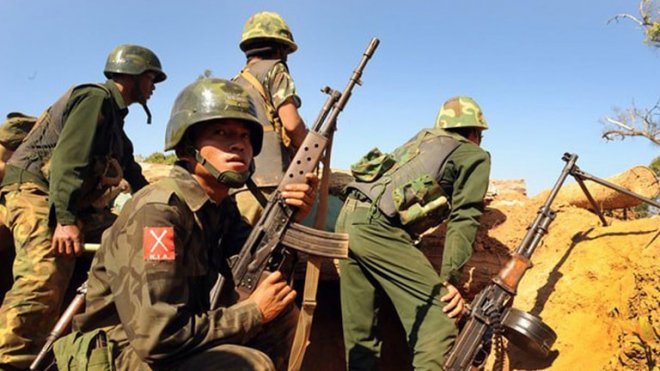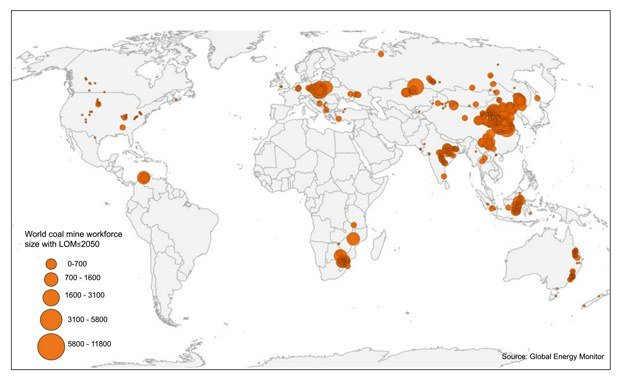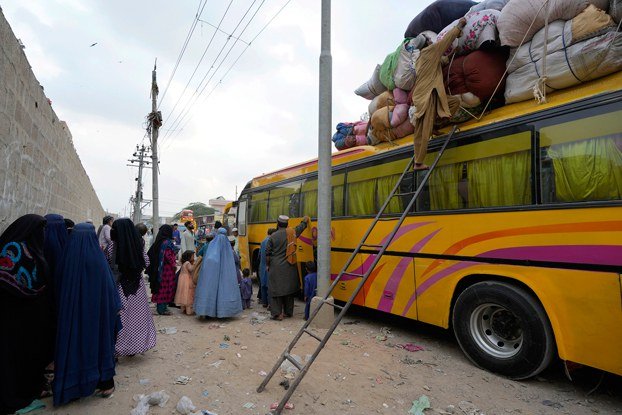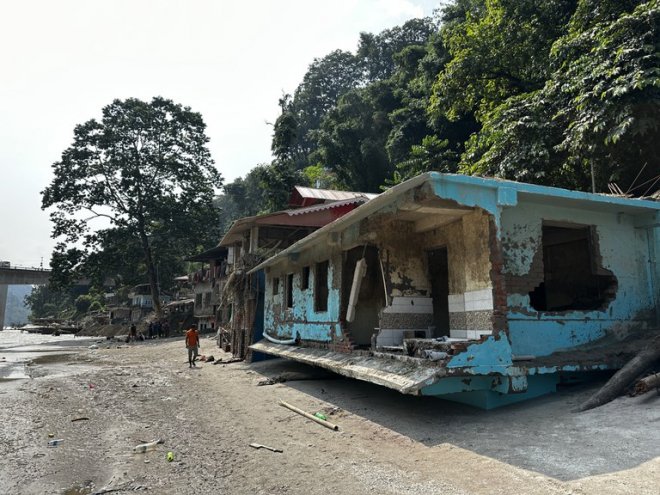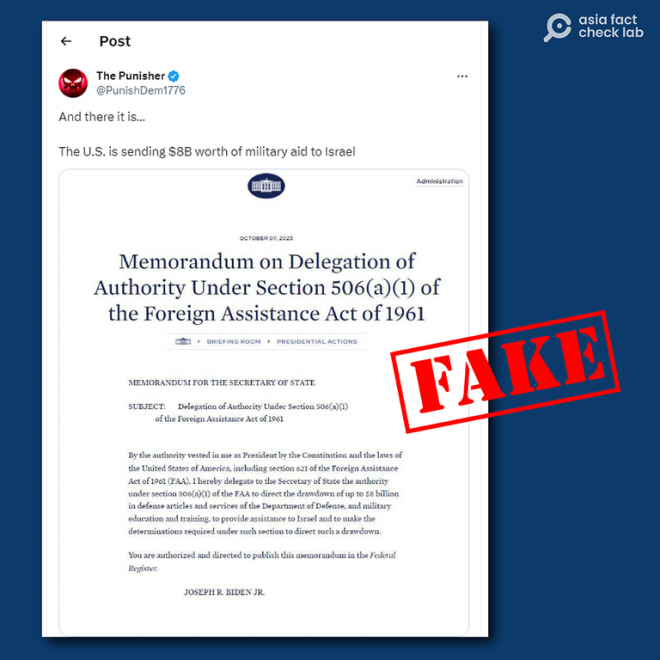Philippines raises concerns with China about spiraling Taiwan tensions
The Philippines on Saturday raised concerns with China about soaring tensions related to neighbor Taiwan when the two countries’ top diplomats met in Manila.The meeting between Chinese Foreign Minister Qin Gang and Foreign Secretary Enrique Manalo came amid heightened rhetoric over the Philippines recently granting the United States access to four additional military bases, two of them fronting Taiwan, which Beijing considers a renegade province.
“Manalo reaffirmed the Philippines’ adherence to the One China Policy, while at the same time expressing concern over the escalating tensions across the Taiwan Strait,” said a statement by the Department of Foreign Affairs (DFA) after a meeting of the two officials.
Manalo also told his Chinese counterpart that the Philippines continues to pursue “an independent foreign policy, which seeks to ensure stability and prosperity in the region," according to a report by BenarNews, an affiliate of Radio Free Asia.
For his part, China’s Qin reminded Manalo of the “promises” the two nations have made to each other, in what appeared to be an oblique reference to the One China policy, which Beijing’s envoy to the Philippines brought up last week in not so delicate a fashion.
Qin called the situation “‘fluid’ and turbulent,” without elaborating.
“[A] healthy and stable China-Philippines relationship is not only meeting the aspirations of our two peoples, but also in line with the common aspirations of regional countries,” he said.
“We need to work together to continue our tradition of friendship, deepen mutually beneficial cooperation, and properly resolve our differences in the spirit of credibility, consultation, and dialogue, and keep our promises to each other so as to bring more benefits to our two countries and people and inject greater positive energy to the peace and stability of this region and the whole world,” Qin added.
Analysts had called expanded access to Philippine military bases “central” to Washington’s aim to deter any plan by Beijing to attack Taiwan.
China has said it amounted to interference.
But the latest controversy involving China was the warning of its envoy here to the Philippines.
Ambassador Huang Xilian had strongly advised Manila to “unequivocally oppose” Taiwan’s independence rather than fan the flames of conflict by offering the U.S. military additional access to bases. He also commented on the safety of 150,000 Filipino workers in Taiwan.
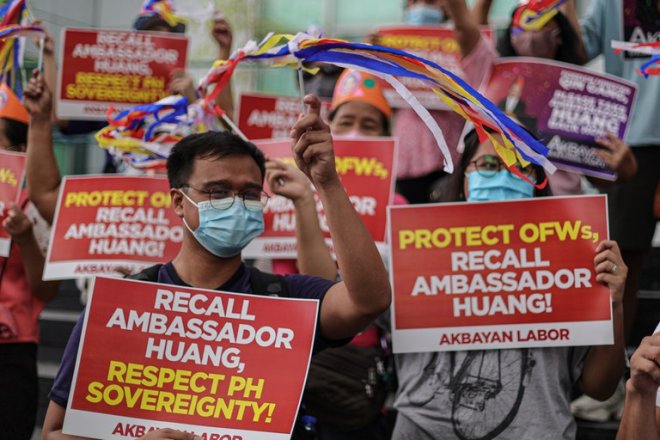 Protesters hold signs demanding the expulsion of Huang Xilian, the Chinese envoy to the Philippines, outside the Chinese Consulate in Makati City, the Philippines, April 21, 2023. [Gerard Carreon/BenarNews]
Protesters hold signs demanding the expulsion of Huang Xilian, the Chinese envoy to the Philippines, outside the Chinese Consulate in Makati City, the Philippines, April 21, 2023. [Gerard Carreon/BenarNews]The Philippine government and opposition slammed the Chinese envoy for his statements on Manila’s policy on Taiwan and its workers on the neighboring island, saying they will not brook any attempts at intimidation by Beijing.
Philippine President Ferdinand Marcos Jr. later downplayed the Chinese envoy’s comments noting the latter’s speech released in English may have been “lost in translation.”
On Saturday Marcos met with China’s Qin and called the meeting “useful.”
“Some of the pronouncements that have been made recently by our two countries and many other countries might be misinterpreted,” according to a statement released by Marcos’ office.
“So today it was really useful that we were able to speak with Minister Qin Gang, the Foreign Minister of China, so we can talk directly to one another and iron things out.”
South China Sea issue
Qin’s visit came even as the Philippines is hosting more than 12,000 American soldiers for the largest-ever joint exercises between the two long-time allies.
The exercises were for “maritime defense, territorial defense, [and] coastal defense,” a Filipino military official said last month, amid seemingly hostile actions by Beijing in the South China Sea, parts of which both countries claim.
During the meeting Saturday with the top Chinese diplomat, his Philippine counterpart Manalo raised the issue of the disputed waterway.
“Our leaders have agreed that our differences in the West Philippine Sea are not the sum total of our relations,” he said, referring to the part of the South China Sea that lies within the exclusive economic zone of the Philippines.
“These differences should not prevent us from seeking ways of managing them effectively, especially with respect to the enjoyment of rights of Filipinos, especially our fisherfolk.”
Manila has said that China has ramped up its presence in the Philippine Exclusive Economic Zone in the disputed sea and increased harassment of Filipino fishermen in recent years.
At a high-level foreign department consultation last month on the sea dispute, the government reminded China that intimidation and coercion have no place in solving the issue.
While there have been significant developments already after the bilateral consultative meeting, Manalo noted that much still needed to be done.
Philippine President Marcos on Saturday referred to the dispute saying more communication would help.
“As to the conflicts, we agreed to establish more lines of communications so that any event that occurs in the West Philippine Sea that involves China and the Philippines can immediately be resolved,” he said.
“So we are currently working on that and are awaiting the Chinese response and we are confident that these issues would be worked out that would be mutually beneficial for both our nations.”
Manila had recently lodged a complaint about the swarming of more than 40 Chinese fishing boats, which were escorted by a Chinese Coast Guard ship and a People’s Liberation Army (PLA) Navy ship near Pag-asa (Thitu), one of the Philippine-occupied islands in the disputed waters.
In February, a CCG ship allegedly pointed a laser towards a Philippine Coast Guard vessel in Ayungin Shoal (Second Thomas Shoal).
Still, as the Philippines’ Foreign Secretary Manalo noted, China has remained the country’s top trading partner over the past few years, even amid the COVID-19 pandemic. And when Marcos visited Beijing in January, he took home investment pledges worth about U.S. $22.8 billion.
Meanwhile, Marcos is scheduled to make his second visit within a year to the U.S. on May 1, when he is set to meet with U.S. President Joe Biden in the White House.
The two leaders are expected to discuss deepening political and economic ties, Washington and Manila said on Friday.
And Biden is expected to “reaffirm the United States’ ironclad commitment to the defense of the Philippines.”
BenarNews is an online news outlet affiliated with Radio Free Asia.
[圖擷取自網路,如有疑問請私訊]
|
本篇 |
不想錯過? 請追蹤FB專頁! |
| 喜歡這篇嗎?快分享吧! |
相關文章
AsianNewsCast








